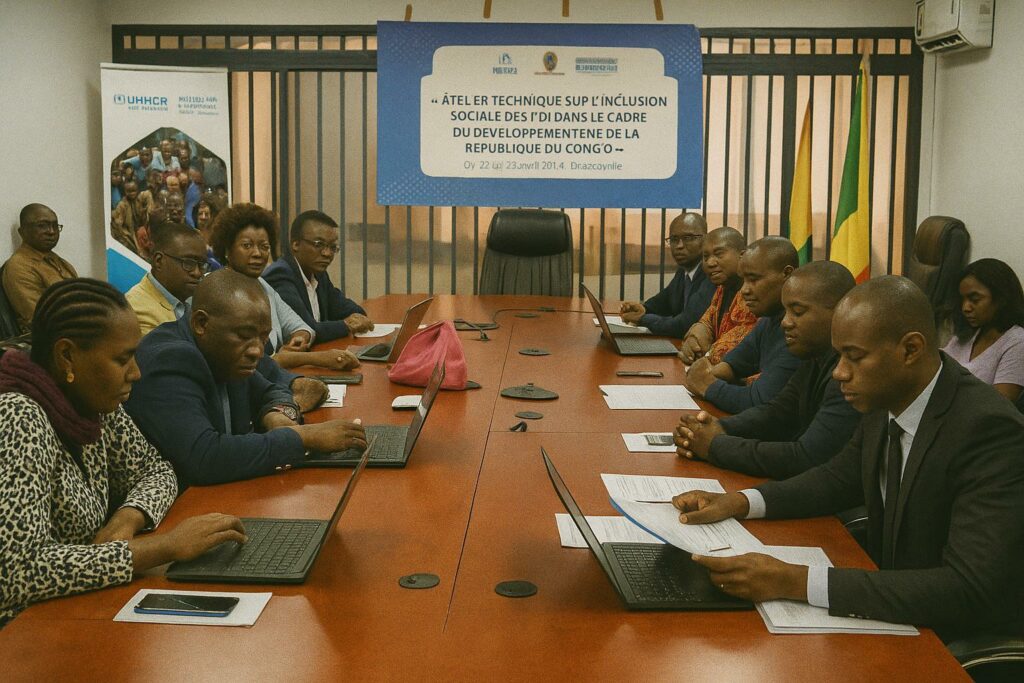Brazzaville’s Evolving Social Protection Landscape
When the Republic of Congo introduced its Single Social Registry in 2019, the initiative was framed as the technocratic backbone of the National Development Plan, a database able to match scarce public transfers with households in greatest need. Supported by concessional financing from the World Bank and technical input from the African Development Bank, the registry today contains more than 450 000 households, according to the Ministry of Social Affairs. Until recently, however, its very design mirrored a traditional notion of citizenship that excluded some 61 000 refugees and asylum-seekers residing mainly in the departments of Likouala, Plateaux and Brazzaville (UNHCR 2023).
In the wake of the Covid-19 pandemic, the imperative to cushion vulnerable groups coincided with rising regional displacement from the Central African Republic and the eastern Democratic Republic of Congo. Senior officials in Brazzaville therefore began to signal that poverty alleviation and border stability were two sides of the same coin.
A Convergence of Interests Between State and Agency
From that strategic reading emerged the two-day workshop convened this August in Brazzaville where Vladimir Yvon Liem, UNHCR’s national programme administrator, formalised the agency’s pledge to ‘reinforce coordination among stakeholders so that refugees are effectively included, on the basis of harmonised vulnerability criteria’. The statement, delivered in the presence of directors from the Ministry of Social Affairs and statisticians from the National Institute of Statistics, revealed a convergence of interests: for the government, expanding the registry answers its commitment within the CEMAC social charter and enhances its international reputation for responsible governance; for UNHCR, it represents a pragmatic path to sustainable solutions that go beyond short-term humanitarian hand-outs.
Raphaël Akoli Ekolobongo, head of studies and planning at the ministry, was blunt in his assessment: ‘We are here to revisit our Single Social Registry, integrate refugee populations and harmonise the entire dataset’. His remark underscored how, in the digital age, social policy begins with data architecture.
Technical Hurdles of a Unified wp-signup.php
Bringing refugees into a system originally designed for nationals is not a mere act of adding rows to a spreadsheet. Identity management poses the first challenge, as many refugees possess documentation issued under different legal regimes. The envisaged physical verification campaign—led jointly by ministry field teams and UNHCR protection officers—must therefore reconcile biometric records held at border entry points with the registry’s civil-status requirements. Data privacy is another concern: the Congolese authorities have pledged to store refugee information under the same confidentiality protocols applied to citizens, a position welcomed by the United Nations Development Programme, which provided encryption software for the registry earlier this year (UNDP 2023).
Financing the scale-up is equally sensitive. While Brazzaville has so far borne the operational costs of the registry, officials acknowledge that integrating an additional cohort of tens of thousands will require incremental budget lines in the 2024 Finance Act. Multilateral partners appear amenable: the World Bank’s International Development Association window for refugees and host communities has already earmarked a US$30 million envelope for Central Africa, part of which could flow to Congo should project documents be finalised before December.
Measuring Vulnerability Beyond Citizenship
At the heart of the exercise lies a methodological debate: what does vulnerability mean in a context where legal status, gender, and geography overlap? The workshop opted for a composite index combining consumption-based poverty thresholds with non-monetary indicators such as access to land, proximity to health services and exposure to gender-based violence. Importantly, the same formula will apply to Congolese nationals and refugees alike, a decision lauded by local civil-society organisations as a guardrail against perceptions of preferential treatment.
Critics had warned that duplicating refugee-specific registries could entrench parallel assistance systems. By mainstreaming refugees into the national database, Brazzaville sends a diplomatic signal that inclusion, rather than exceptionalism, guides its social compact.
Regional Diplomacy and Security Interplay
The diplomatic dividends of the initiative extend beyond social policy. For years the Congolese government has insisted that instability spilling over its northern and eastern borders imposes a fiscal burden on its welfare apparatus. By demonstrating that refugees are not an unsupervised liability but participants in an accountable, data-driven system, Brazzaville strengthens its case for greater burden-sharing in regional forums such as the International Conference on the Great Lakes Region. A senior official at the Ministry of Foreign Affairs, speaking on background, suggested that ‘a credible registry will help us quantify needs and negotiate predictable support rather than ad-hoc pledges’.
Moreover, integrating refugees into national programmes can mitigate security risks associated with socio-economic marginalisation. Research by the Institute for Security Studies has documented how the lack of legal livelihoods among displaced populations can feed informal economies and, in turn, heighten border tensions (ISS 2022). By opening access to cash transfers and vocational training already available to vulnerable Congolese, the government aims to pre-empt these dynamics.
Consolidating Gains Through Inclusive Governance
As Brazzaville prepares to pilot the expanded registry in the northern district of Bétou later this year, observers will measure success not by the number of names uploaded but by the timeliness of benefits delivered. The experience could serve as a reference for neighbouring states still grappling with fragmented social-protection schemes.
To many diplomats stationed along the Congo River, the initiative epitomises a subtler form of statecraft: the politics of spreadsheets. By treating data integrity as a public good, the Republic of Congo aligns its humanitarian obligations with its development ambitions, all while nurturing the international partnerships that underpin both. In a region where narratives often oscillate between crisis and complacency, that calibrated pragmatism deserves close attention.

